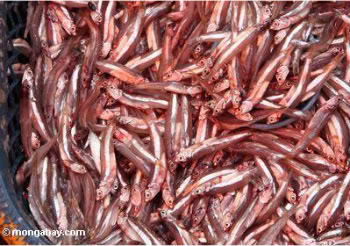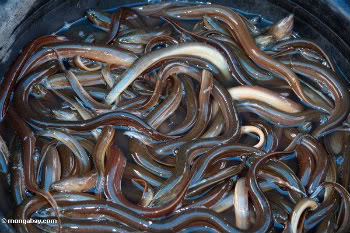|
|
Recommendations by international health agencies, doctors, nutritionists, and the media to consume more fish for better health ignore the fact that fish stock are collapsing worldwide, reports a new study published in the Canadian Medical Association Journal.
“Even at current levels of fish consumption, fisheries globally have reached a state of severe crisis. Already, the demand from affluent and developing economies, particularly newly affluent China, cannot be met by the world’s fisheries,” states the new report.
Not only are recommendations to consume more fish—sometimes two to three times current levels—driving fisheries to the brink and species to extinction, they are also harming developing nations that have depended on fish as a local source of protein for centuries. Most wealthy nations have already depleted their fish stocks, leading them to increasingly turn to poorer nations for fish.
 Red anchovies at fish market in Ranteapo, Sulawesi. Photo by: Rhett A. Butler. |
“Declining catches are increasingly diverted toward affluent markets rather than local ones, with dire consequences for the food security of poorer nations, islands and coastal communities,” write the authors.
While the authors note that the science remains inconclusive regarding the health benefits of increasing fish consumption, the peril to fisheries is clear. According to the study, fisheries have been declining since the 1980s while the number of collapsed stocks have risen exponentially.
“These trends imply the collapse of all commercially exploited stocks by mid-century,” state the authors. “Yet the dire status of fisheries resources is largely unrecognized by the public, who are both encouraged to eat more fish and are misled into believing we live in a sea of plenty.”
 Live eels for sale at fish market in Ranteapo, Sulawesi. Photo by: Rhett A. Butler. |
In addition the authors argue that one of the widely touted solutions to fishery collapse, i.e. fish farming, is more of a “distraction” than a solution, since the practice comes with its own environmental problems. Most notably, fish farming depends on stocks of small wild fish like anchovies to feed the large predatory fish which they sell, further threatening wild stocks. A better solution, write the authors, may be the development of alternative sources of omega-3 fatty acids; currently such sources are being developed from algae, yeast, and plants.
The authors conclude that due to the plight of global fish stocks, health agencies should rethink their policy of encouraging fish consumption.
Related articles
One-third of global marine catch used as livestock feed
(10/30/2008)
Despite continuous warnings of emptying oceans due to overfishing, a new report finds that one-third of the world’s total marine catch is not feeding humans, but livestock. The fish are ground-up into meal and fed to pigs, poultry, and even farm-raised fish.
A solution to worldwide fishery collapse?
(09/18/2008)
In November 2006 a study on global fisheries received a lot of attention: employing 53 years worth of fishery data, Boris Worm predicted that by 2048 the ocean would be empty of fish. Essentially there would be nothing left to catch. Already, Worm reported, fishing stocks had collapsed in 29 percent of the world’s fisheries. Although scientists called for rapid and overhauling changes to fisheries, the fishing industry carried on business-as-usual. Now, two years later, a study in Science proposes to have found the solution to the global fishery-collapse.
Small-scale fisheries are “best hope” for sustainability in developing world
(09/08/2008)
Fish stocks are declining globally. While the consumer in the industrial world has yet to feel the full impact of this decline, those in the developing world know it well. Local small-scale fishermen are catching less fish to feed growing populations. Jennifer Jacquet of the Sea Around Us Project believes the hope for sustainable seafood lies in these very fisheries.
The long-ignored ocean emergency and what can be done to address it
(08/18/2008)
This year has been full of bad news regarding marine ecosystems: one-third of coral species threatened with extinction, dead-zones spread to 415 sites, half of U.S. reefs in fair or bad condition, increase in ocean acidification, tuna and shark populations collapsing, and only four percent of ocean considered pristine. Jeremy Jackson, director of the Scripps Center for Marine Biodiversity and Conservation at the University of California, San Diego, synthesizes such reports and others into a new paper, published in the journal Proceedings of the Naional Academy of Sciences, that boldly lays out the scope of the oceanic emergency and what urgently needs to be done.
The global rich are eating the poor’s fish: new report shows tropical fish catch gravely under-estimated
(07/10/2008)
After a week of bad news regarding marine life — it was reported that half of U.S. coral reefs are in fair to poor condition and one-third of all coral species are threatened globally — there is still more: a study of twenty tropical islands showed that recreational and subsistence fishing has gone almost completely unreported from 1950 to 2004. In fifteen of twenty cases the fish take was at least doubled when local fish catches were added, and in the most extreme case, American Samoa, the amount of fish collected was 17 times what was previously recorded.
Large shark populations fall 97% in the Mediterranean
(06/12/2008)
Populations of some shark species in the Mediterranean have plunged by more than 97 percent over the past 200 years, report researchers writing in the journal conservation Biology. Several species are at risk of extinction.